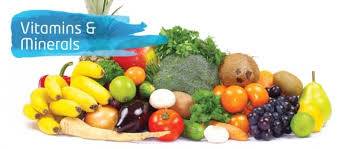HOLISTICALLY YOURS·FRIDAY, 15 MARCH 2019·
I have been asked recently about Minerals and Vitamins and what should one take to help keep a healthy balance! It’s not easy as so many of us have different health requirements, or on prescribed medication and, quite simply don’t eat the foods that could potentially help with the bodies requirements. But if you do want to look into the subject of both Minerals and Vitamins, I am hoping that by having some information in the following weeks articles on the subject of these micronutrients you’ll gain a better understanding of what these vitamins and minerals actually do in the body and why you want to make sure you’re getting enough of them.
Minerals and Vitamins are essential nutrients as they perform hundreds of roles in our body. However, there is a fine line between getting enough of these nutrients (healthy) and getting too much (which can end up harming you). Essential nutrients for your body.
Every day, your body produces skin, muscle, and bone. It churns out that rich red blood that carries nutrients and oxygen to remote outposts, and it sends nerve signals skipping along thousands of miles of brain and body pathways. It also formulates chemical messengers that shuttle from one organ to another, issuing the instructions that help sustain your life.
But to do all this, your body requires some raw materials. These include at least 30 vitamins, minerals, and dietary components that your body needs but cannot manufacture on its own in sufficient amounts.Vitamins and minerals are considered essential nutrients, because they perform hundreds of roles in the body. They help shore up bones, heal wounds, and bolster your immune system. They also convert food into energy, and repair cellular damage.Micronutrients play a big role in the body.

Vitamins and minerals are often called micronutrients because your body needs only tiny amounts of them. Yet failing to get even those small quantities virtually guarantees disease. Here are a few examples of diseases that can result from vitamin deficiencies:
Scurvy – Old-time sailors learned that living for months without fresh fruits or vegetables the main sources of vitamin C cause the bleeding gums and listlessness of scurvy.
Blindness – In some developing countries, people still become blind from vitamin A deficiency.
Rickets – A deficiency in vitamin D can cause rickets, a condition marked by soft, weak bones that can lead to skeletal deformities such as bowed legs. Partly to combat rickets the U.S. has fortified milk with vitamin D since the 1930s.
In France, several products are fortified with vitamin D, especially dairy products, but also some breakfast cereals and vegetable oils, however, in the UK, cows’ milk is generally not a good source of vitamin D because it isn’t fortified, as it is in some other countries. If you are non dairy you can reach for the Plant based alternatives such as soy milk, almond milk, coconut milk, and rice milk, may be a good option for getting vitamin D.
Just as a lack of key micronutrients can cause substantial harm to your body, getting sufficient quantities can provide a substantial benefit including:
Strong bones – A combination of calcium, vitamin D, vitamin K, magnesium, and phosphorus protects your bones against fractures.
Healthy teeth – The mineral fluoride not only helps bone formation but also keeps dental cavities from starting or worsening.
The difference between vitamins and minerals:
Although they are all considered micronutrients, vitamins and minerals differ in basic ways. Vitamins are organic and can be broken down by heat, air, or acid. Minerals are inorganic and hold on to their chemical structure. Interacting in good ways and bad.
Many micronutrients interact. Vitamin D enables your body to pluck calcium from food sources passing through your digestive tract rather than harvesting it from your bones. Vitamin C helps you absorb iron.Water-soluble vitaminsWater-soluble vitamins are packed into the watery portions of the foods you eat.
They are absorbed directly into the bloodstream as food is broken down during digestion or as a supplement dissolves. Because much of your body consists of water, many of the water-soluble vitamins circulate easily in your body. Your kidneys continuously regulate levels of water-soluble vitamins, shunting excesses out of the body in your urine.
Water-soluble vitamins include
B vitamins:
Biotin (vitamin B7)
Folic acid (folate, vitamin B9)
Niacin (vitamin B3)
Vitamin B5
Riboflavin (vitamin B2)
Thiamin (vitamin B1)
Vitamin B6
Vitamin B12
Vitamin C
What they do:
Although water-soluble vitamins have many tasks in the body, one of the most important is helping to free the energy found in the food you eat. Others help keep tissues healthy and also:
Release energy
Produce energy
Build proteins and cells
Make collagen
Water-soluble vitamins can stay in the body for long periods of time. We probably have several years’ supply of vitamin B12 in our liver. And even folic acid and vitamin C stores can last more than a couple of days. Generally, though, water-soluble vitamins should be replenished every few days.
* There is a small risk that consuming large amounts of some of these micronutrients through supplements may be quite harmful.
For example, very high doses of B6 many times the recommended amount of 1.3 milligrams (mg) per day for adults can damage nerves, causing numbness and muscle weakness.
Fat-soluble vitamins: Rather than slipping easily into the bloodstream like most water-soluble vitamins, fat-soluble vitamins gain entry to the blood via lymph channels in the intestinal wall. Many fat-soluble vitamins travel through the body only under escort by proteins that act as carriers. To some extent, you can think of these vitamins as time-release micronutrients. It’s possible to consume them every now and again, perhaps in doses weeks or months apart rather than daily, and still get your fill. Your body squirrels away the excess and doles it out gradually to meet your needs.
Fat-soluble vitamins
Vitamin A
Vitamin D
Vitamin E
Vitamin K
What they do?
These four vitamins helps keep your eyes, skin, lungs, gastrointestinal tract, and nervous system in good repair.
They also play an essential role in:
Building bones – Bone formation would be impossible without vitamins A, D, and K.
Protect vision – Vitamin A also helps keep cells healthy and protects your vision.
Interact favourably – Without vitamin E, your body would have difficulty absorbing and storing vitamin A.
Protect the body – Vitamin E also acts as an antioxidant which is a compound that helps protect the body against damage from unstable molecules.
*Because fat-soluble vitamins are stored in your body for long periods, toxic levels can build up. This is most likely to happen if you take supplements. It’s very rare to get too much of a vitamin just from food.
Major minerals travel through the body in various ways. Potassium, for example, is quickly absorbed into the bloodstream, where it circulates freely and is excreted by the kidneys, much like a water-soluble vitamin. Calcium is more like a fat-soluble vitamin because it requires a carrier for absorption and transport.
Major Minerals:
Calcium
Chloride
Magnesium
Phosphorus
Potassium
Sodium
Sulfur
What do Minerals do for us?
One of the key tasks of major minerals is to maintain the proper balance of water in the body. Sodium, chloride, and potassium take the lead in doing this.
Three other major minerals are calcium, phosphorus, and magnesium which are important for healthy bones.
Sulfur helps stabilize protein structures, including those that make up hair, skin, and nails.
Having too much of one major mineral can result in a deficiency of another. These sorts of imbalances are usually caused by overloads from supplements, not food sources.
Here are two examples:
Salt overload – Calcium binds with excess sodium in the body and is excreted when the body senses that sodium levels must be lowered. That means that if you ingest too much sodium through table salt or processed foods, you could end up losing needed calcium as your body rids itself of the surplus sodium.
Excess phosphorus – Likewise, too much phosphorus can hamper your ability to absorb magnesium.
Trace Minerals
A thimble could easily contain the distillation of all the trace minerals normally found in your body. Yet their contributions are just as essential as those of major minerals such as calcium and phosphorus, which each account for more than a pound of your body weight.
Trace minerals
Chromium
Copper
Fluoride
Iodine
Iron
Manganese
Molybdenum
Selenium
Zinc
What they do?
Trace minerals carry out a diverse set of tasks.
Here are a few examples:
Iron is best known for ferrying oxygen throughout the body.
Fluoride strengthens bones and wards off tooth decay.
Zinc helps blood clot, is essential for taste and smell, and bolsters the immune response.
Copper helps form several enzymes, one of which assists with iron metabolism and the creation of haemoglobin, which carries oxygen in the blood.
Trace minerals interact with one another, sometimes in ways that can trigger imbalances. Too much of one can cause or contribute to a deficiency of another. When the body has too little iodine, thyroid hormone production slows, causing sluggishness and weight gain as well as other health concerns.
The problem worsens if the body also has too little selenium.*The difference between “just enough” and “too much” of the trace minerals is often tiny.
Generally, food is a safe source of trace minerals, but if you take supplements, it’s important to make sure you’re not exceeding safe levels, always follow the advice of your GP, Pharmacist or the box!
Antioxidants
Antioxidant is a term for any compound that can counteract unstable molecules such as free radicals that damage DNA, cell membranes, and other parts of cells. Your body cells naturally produce plenty of antioxidants to put on patrol. The foods you eat and, perhaps, some of the supplements you take are another source of antioxidant compounds.
Carotenoids – such as lycopene in tomatoes and lutein in kale.
Flavonoids – such as anthocyanins in blueberries, quercetin in apples and onions, and catechins in green tea) are antioxidants.
Vitamins C and E and the mineral selenium also have antioxidant properties.
Summary
Eating a healthy diet is the best way to get your antioxidants by fuelling your body with healthy food before you turn to supplements. The best bet is to make sure you eat a balanced diet with as many whole foods as possible.
Note – my research is from my coursework, books and the internet, I have tried to include as much as I can in this first part but have a more in-depth article for anyone interested! I will be creating a bi-monthly news letter very soon and will be including the full articles from these bite sized portions!
Yes there’s more – there is always more and you know what they say “Knowledge is Power” ![]()




